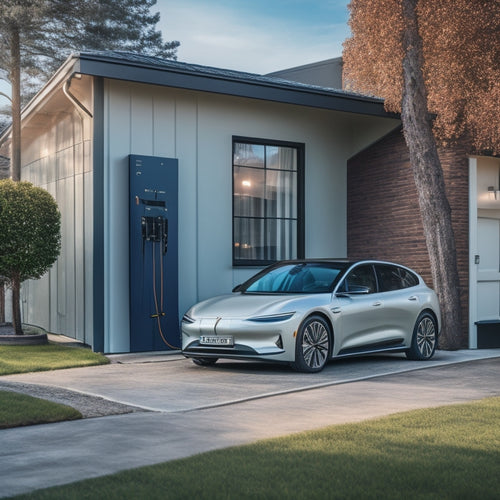
Top 10 Tips for Buying Solar EV Kits Online
Share
When purchasing a solar EV kit online, you'll want to do your due diligence to guarantee a smooth and successful purchase. Research reputable online retailers with secure connections and SSL certificates. Verify product certifications, like UL compliance, and check for durable materials that can withstand harsh outdoor conditions. Understand your energy needs through an energy audit and load calculation to choose the right kit size. Read customer reviews carefully, watching out for biases and fake reviews. Consider expandability options and warranty coverage. By following these initial steps, you'll be well on your way to making an informed purchase, and there's more to explore to guarantee a seamless experience.
Key Takeaways
• Research online retailers with secure connections, SSL certificates, and transparent business practices to ensure a trustworthy purchase.
• Verify solar panel compatibility with your charging system requirements and conduct an energy audit to determine the right kit size.
• Look for certifications like UL compliance, industry standards, and manufacturer certifications for safety, performance, and quality assurance.
• Prioritize durable materials, weather-resistant coatings, and UV protection to ensure the kit can withstand outdoor conditions.
• Check for reliable reviews, warranty coverage, and responsive customer support to ensure post-purchase assistance and maintenance.
Research Reputable Online Retailers
When scouring the internet for solar EV kits, researching reputable online retailers is vital to guarantee a smooth and secure purchasing experience. You want to make sure that your sensitive information remains protected and your purchase is backed by a trustworthy seller.
To achieve this, it's important to look for online retailers that prioritize online security. Check if the website has an 'https' prefix, indicating a secure connection, and verify if they've a valid SSL certificate. Additionally, research the retailer's transparency by reading reviews, checking their physical address, and understanding their return and refund policies.
A reputable retailer will provide clear and concise information about their products, shipping, and customer support. Be cautious of retailers with poor or no transparency, as this can be a red flag for potential scams. By doing your due diligence, you'll be more confident in your purchase and can focus on enjoying the benefits of your new solar EV kit.
Check Solar Panel Compatibility
Before investing in a solar EV kit, confirming the compatibility of the solar panels with your electric vehicle's charging system is crucial to guarantee seamless and efficient energy harvesting. You need to verify that the solar panels can supply power to your vehicle's battery within the recommended voltage and current ranges.
Here's a checklist to verify compatibility:
| Compatibility Factor | Considerations |
|---|---|
| Panel Efficiency | Make sure the solar panel's efficiency matches your vehicle's charging system requirements |
| Battery Match | Validate the solar panel's voltage and current output matches your vehicle's battery specifications |
| Charging System Type | Confirm the solar panel is compatible with your vehicle's charging system type (e.g., Level 1, Level 2, or DC Fast Charging) |
| Power Output | Check the solar panel's power output matches your vehicle's charging power requirements |
| Warranty and Support | Guarantee the solar panel manufacturer provides adequate warranty and support for EV applications |
Understand Your Energy Needs
To optimize your solar EV kit's performance, you must accurately determine how much energy your electric vehicle consumes on a daily basis. This important step is often overlooked, but it's vital to make sure you're getting the right solar EV kit for your needs.
Conducting an energy audit will help you identify your energy usage patterns, which will, in turn, help you determine the appropriate solar EV kit size.
Performing a load calculation is another critical step in understanding your energy needs. This involves calculating the total energy required to charge your electric vehicle, taking into account factors such as your daily commute, charging frequency, and battery capacity.
A thorough load calculation will give you a clear picture of your energy requirements, allowing you to choose a solar EV kit that can efficiently meet those needs.
Verify Product Certifications
You've determined your energy needs, now it's time to confirm that the solar EV kit you're considering meets industry standards, so verify that it's certified by reputable organizations. This step is essential in ensuring your safety and the kit's performance.
When verifying certifications, look for the following:
-
UL compliance: Make sure the kit has undergone testing and meets the standards set by Underwriters Laboratories, a renowned product safety organization.
-
Industry standards: Check if the kit meets the industry standards for solar EV kits, such as those set by the International Electrotechnical Commission (IEC) or the International Organization for Standardization (ISO).
-
Manufacturer's certifications: Check if the manufacturer has obtained certifications from recognized organizations, such as the International Association of Electrical Inspectors (IAEI) or the National Electrical Manufacturers Association (NEMA).
Look for Durable Materials
When shopping for a solar EV kit online, you need to prioritize durability to guarantee your investment lasts.
Look for kits with aluminum frames, which are more resistant to corrosion and can withstand harsh outdoor conditions.
Additionally, check if the panels have weather-resistant coatings to protect them from the elements and maintain their efficiency.
Aluminum Frames Matter
By selecting solar EV kits with aluminum frames, you significantly reduce the risk of structural damage and corrosion, ensuring a longer lifespan for your investment. Aluminum frames play a vital role in the durability of a solar EV kit, providing a sturdy foundation for the entire system.
In terms of frame durability, aluminum stands out from other materials due to its exceptional rust resistance. This means that even in harsh environmental conditions, your solar EV kit will maintain its structural integrity and functionality.
Here are some benefits of aluminum frames in solar EV kits:
-
Lightweight yet strong: Aluminum frames offer an ideal balance of weight and strength, making them perfect for solar EV kits that require minimal weight without compromising on durability.
-
Corrosion-resistant: Aluminum frames are highly resistant to corrosion, ensuring that your solar EV kit remains functional even in harsh environmental conditions.
-
Cost-effective: Aluminum frames are often more cost-effective than other materials, making them an attractive option for those on a budget.
Weather-Resistant Coatings
To guarantee the durability of your solar EV kit in harsh outdoor conditions, look for weather-resistant coatings that can effectively shield the system from moisture, UV rays, and extreme temperatures. You'll want to make sure the coatings provide excellent UV protection to prevent degradation of the system's components.
When evaluating weather-resistant coatings, consider the coating durability, adhesion, and flexibility. Look for coatings with a high level of scratch resistance and abrasion resistance to withstand harsh environmental conditions. Additionally, opt for coatings with a high degree of water resistance to prevent water ingress and corrosion.
A good weather-resistant coating should also be able to expand and contract with temperature fluctuations without compromising its integrity. By selecting a solar EV kit with a high-quality, weather-resistant coating, you can rest assured that your investment will withstand the test of time and harsh outdoor conditions.
Don't compromise on the coating quality - it's essential for the long-term performance and reliability of your solar EV kit.
Compare Prices and Discounts
You'll find that online marketplaces and retailers often offer varying prices for the same solar EV kit, making it crucial to compare prices and discounts across different platforms before making a purchase. This guarantees you get the best deal for your money.
When comparing prices, make sure to factor in any discounts, promo codes, or price matching policies that may be available. Here are some tips to keep in mind:
-
Check for price matching policies: Some retailers offer to match a lower price offered by a competitor, so it's worth inquiring about this before making a purchase.
-
Look for discount codes and promo offers: Keep an eye out for limited-time discounts, bundle deals, or loyalty rewards that can help reduce the cost of your solar EV kit.
-
Consider refurbished or certified pre-owned options: Refurbished or certified pre-owned solar EV kits can offer significant savings while still providing a high-quality product.
Read Customer Reviews Carefully
When researching solar EV kits online, customer reviews are a treasure trove of valuable insights, offering firsthand accounts of a product's performance, durability, and overall user experience. As you read through reviews, keep a critical eye out for fake reviews, which can be misleading and sway your purchasing decision.
Be cautious of reviews that seem overly positive or repetitive, as they might be sponsored or fake. You should also be aware of review bias, where reviewers have a vested interest in promoting or discrediting a product. Look for reviews from verified purchasers, as they're more likely to provide an honest assessment of the product.
Pay attention to the reviewer's experience level, as those with more experience may provide more insightful feedback. By carefully analyzing customer reviews, you can gain a more thorough understanding of the solar EV kit's strengths and weaknesses, making a more informed purchase decision.
Check Warranty and Support
When purchasing a solar EV kit online, you'll want to carefully examine the warranty and support provided by the seller.
You should find out exactly what's covered and for how long, as well as the expected response time for maintenance and repair assistance.
Warranty Period Details
The warranty period details of your solar EV kit are vital, as they dictate the duration of support and coverage you can expect from the manufacturer. When buying online, it's important to understand the warranty terms to make sure you're protected in case of defects or malfunctions.
Here are some key aspects to look out for:
-
Manufacturer obligations: Check what the manufacturer is responsible for during the warranty period, including repairs, replacements, or refunds.
-
Policy exclusions: Be aware of what's not covered under the warranty, such as damage caused by misuse or natural disasters.
-
Warranty extension options: Find out if you can extend the warranty period, and at what cost, to guarantee continued support beyond the initial warranty duration.
Support Response Time
You'll also want to confirm the support response time, which directly impacts how quickly you'll receive assistance in case of an issue, and make sure it aligns with your expectations. A critical response time is essential when dealing with technical issues, and you don't want to be left waiting for hours or even days for a resolution. Look for a provider that offers a 24/7 help desk with a guaranteed response time, ensuring that you'll get the help you need when you need it.
When evaluating the support response time, consider the following:
- What's the average response time?
- Are there different tiers of support, and if so, what're the corresponding response times?
- Are there any additional fees for priority support?
Knowing the answers to these questions will give you a clear understanding of what to expect in case of an issue. By doing your due diligence, you can rest assured that you'll receive timely support, minimizing downtime and getting you back on the road sooner.
Maintenance Assistance
Your solar EV kit's warranty and support quality can greatly impact the overall maintenance experience. When purchasing online, it's vital to take into account the level of maintenance assistance provided by the manufacturer or seller. You want to make sure that you're supported throughout the lifespan of your solar EV kit.
Here are some key aspects to look for:
-
Scheduled Checkups: Seek out manufacturers that offer regular checkups or maintenance schedules to guarantee your kit is running at its best.
-
Detailed DIY Guides: Check if the seller offers in-depth DIY guides or tutorials to help you troubleshoot and carry out routine maintenance tasks.
-
Specialized Support Team: Ensure the seller has a specialized support team that can assist you with any technical issues or concerns you may have.
Evaluate Shipping and Handling
When purchasing a solar EV kit online, thoroughly reviewing the shipping and handling details is crucial since it directly impacts the overall cost and delivery timeline of your purchase.
You'll want to make certain that the seller has a reliable carrier that can deliver your kit safely and efficiently. Look for carriers with a proven track record of on-time delivery and minimal damage claims.
Additionally, check if the seller offers package insurance, which can provide financial protection in case your kit is lost, stolen, or damaged during transit. Be sure to review the shipping estimates and calculate the total cost, including any additional fees.
You should also clarify the seller's return and refund policies in case you need to send the kit back. By carefully evaluating the shipping and handling details, you can avoid costly surprises and ensure a smooth delivery experience.
Consider Expandability Options
When purchasing a solar EV kit online, you'll want to take into account the expandability options to guarantee your system can adapt to your evolving needs.
You should look for kits with system upgrade paths, modular design benefits, and future-proofing options to maximize your investment.
System Upgrade Paths
Several solar EV kits available online offer scalable designs, enabling you to easily upgrade your system's capacity and features as your needs evolve. This means you can start with a smaller system and add more components as you go, ensuring your investment remains relevant and effective.
When evaluating a solar EV kit, look for systems that offer clear upgrade pathways, allowing you to build upon your initial investment.
Some key factors when assessing a system's upgrade path include:
-
System Scalability: Can the system's capacity be easily increased or decreased as needed?
-
Upgrade Pathways: Are there clear, cost-effective options for upgrading individual components or the entire system?
-
Future-Proofing: Is the system designed with future technologies and innovations in mind, ensuring it remains compatible and adaptable?
Modular Design Benefits
By opting for a solar EV kit with a modular design, you can easily expand your system's capacity and features as needed, allowing you to adapt to changing energy requirements without having to replace the entire system. This means you can start with a smaller setup and add more panels or components as your energy needs grow.
With a modular design, you'll appreciate the ease of installation, which reduces the overall cost and complexity of the process. Additionally, modular systems are often more space-efficient, making them ideal for smaller rooftops or tight spaces.
As you consider different solar EV kits, look for modular designs that allow for easy upgrades and expansions. This flexibility will give you peace of mind, knowing that your system can adapt to your evolving energy needs.
Furthermore, a modular design enables you to upgrade individual components rather than replacing the entire system, reducing electronic waste and saving you money in the long run. By choosing a modular solar EV kit, you'll enjoy the benefits of easy installation, space efficiency, and long-term flexibility.
Future-Proofing Options
Considering your energy needs may evolve over time, you'll want to prioritize solar EV kits that offer future-proofing options, allowing you to seamlessly integrate new technologies or upgrade existing components as they emerge. This guarantees your investment remains relevant and efficient in the long run.
When evaluating future-proofing options, look for kits that:
-
Offer modular designs that allow for easy component swapping or upgrading
-
Provide open architecture that enables seamless integration with emerging technologies
-
Support advanced grid management systems, enhancing grid resilience and tech adaptability
Frequently Asked Questions
Can I Install a Solar EV Kit Myself or Do I Need a Professional?
If you're comfortable with DIY challenges and have electrical knowledge, you can install a solar EV kit yourself, but be prepared to take safety precautions, gather required tools, and consider expert supervision to avoid costly mistakes.
Are Solar EV Kits Compatible With All Electric Vehicle Models?
"Surprise, you're not a solar EV kit genius (yet!). Seriously, though, you'll find that solar EV kits aren't universally compatible due to vehicle restrictions, model limitations, and manufacturer restrictions, so check EV compatibility before buying."
How Long Does It Take to Fully Charge My Electric Vehicle With Solar Power?
You'll want to know that your solar EV kit's charge time depends on the power output, your daily commute, and your vehicle's energy capacity and type, which affects how long it takes to fully charge your electric vehicle.
Can I Use a Solar EV Kit for Both Home and Mobile Charging?
You can definitely use a solar EV kit for both home and mobile charging, thanks to its portability benefits and dual-purpose system design, allowing you to seamlessly switch between stationary and on-the-go charging.
Are Solar EV Kits Eligible for Government Incentives and Tax Credits?
You'll be happy to know that solar EV kits can qualify for Federal Benefits, such as the Solar Investment Tax Credit, and State Incentives, which can greatly reduce your upfront costs and boost your return on investment.
Related Posts
-

Why You Need a Phone Mount for Navigation
When you're on the road, a reliable phone mount is not just a convenience, it's a safety necessity that helps you mai...
-

5 Essential Tips for Buying EV Charging Systems Online
When purchasing an EV charging system online, you'll want to make sure you're making an informed decision. First, det...
-

Top Online Stores for Solar Car Accessories
When searching online for solar car accessories, you'll find top retailers like Amazon, REI Co-op, and Best Buy offer...


